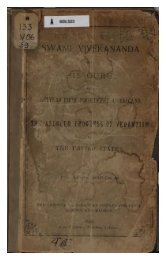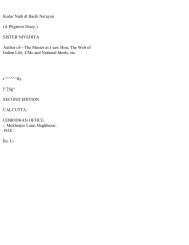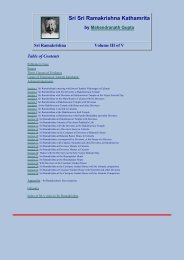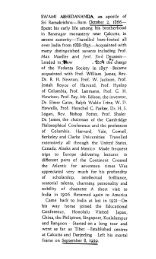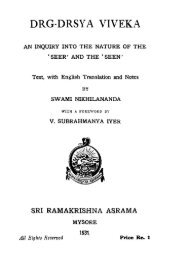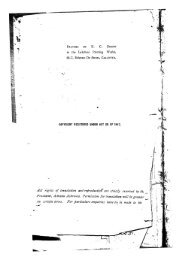<strong>Practical</strong> <strong>Vedanta</strong>which require little things to build them up, never venture to soar high in thought.Their conceptions are very good and helpful to them, even if only of little godsand symbols. But you have to understand the Impersonal, for it is in and throughthat alone that these others can be explained. Take, for instance, the idea of aPersonal God. A man who understands and believes in the Impersonal — JohnStuart Mill, for example — may say that a Personal God is impossible, and cannotbe proved. I admit with him that a Personal God cannot be demonstrated. But Heis the highest reading of the Impersonal that can be reached by the humanintellect, and what else is the universe but various readings of the Absolute? It islike a book before us, and each one has brought his intellect to read it, and eachone has to read it for himself. There is something which is common in the intellectof all men; therefore certain things appear to be the same to the intellect ofmankind. That you and I see a chair proves that there is something common toboth our minds. Suppose a being comes with another sense, he will not see thechair at all; but all beings similarly constituted will see the same things. Thus thisuniverse itself is the Absolute, the unchangeable, the noumenon; and thephenomenon constitutes the reading thereof. For you will first find that allphenomena are finite. Every phenomenon that we can see, feel, or think of, isfinite, limited by our knowledge, and the Personal God as we conceive of Him isin fact a phenomenon. The very idea of causation exists only in the phenomenalworld, and God as the cause of this universe must naturally be thought of aslimited, and yet He is the same Impersonal God. This very universe, as we haveseen, is the same Impersonal Being read by our intellect. Whatever is reality in theuniverse is that Impersonal Being, and the forms and conceptions are given to itby our intellects. Whatever is real in this table is that Being, and the table formand all other forms are given by our intellects.Now, motion, for instance, which is a necessary adjunct of the phenomenal,cannot be predicated of the Universal. Every little bit, every atom inside theuniverse, is in a constant state of change and motion, but the universe as a whole isunchangeable, because motion or change is a relative thing; we can only think ofsomething in motion in comparison with something which is not moving. Theremust be two things in order to understand motion. The whole mass of the universe,taken as a unit, cannot move. In regard to what will it move? It cannot be said tochange. With regard to what will it change? So the whole is the Absolute; butwithin it every particle is in a constant state of flux and change. It is unchangeableand changeable at the same time, Impersonal and Personal in one. This is ourconception of the universe, of motion and of God, and that is what is meant by"Thou art That". Thus we see that the Impersonal instead of doing away with thepersonal, the Absolute instead of pulling down the relative, only explains it to thefull satisfaction of our reason and heart. The Personal God and all that exists in theuniverse are the same Impersonal Being seen through our minds. When we shallbe rid of our minds, our little personalities, we shall become one with It. This iswhat is meant by "Thou art That". For we must know our true nature, thefile:///C|/Documents%20and%20Settings/Chitra%20Selva...oksBySwami/<strong>Practical</strong><strong>Vedanta</strong>/<strong>Practical</strong><strong>Vedanta</strong>PDF.html (28 of 113)2/26/2007 12:24:33 AM
<strong>Practical</strong> <strong>Vedanta</strong>Absolute.The finite, manifested man forgets his source and thinks himself to be entirelyseparate. We, as personalised, differentiated beings, forget our reality, and theteaching of monism is not that we shall give up these differentiations, but we mustlearn to understand what they are. We are in reality that Infinite Being, and ourpersonalities represent so many channels through which this Infinite Reality ismanifesting Itself; and the whole mass of changes which we call evolution isbrought about by the soul trying to manifest more and more of its infinite energy.We cannot stop anywhere on this side of the Infinite; our power, and blessedness,and wisdom, cannot but grow into the Infinite. Infinite power and existence andblessedness are ours, and we have not to acquire them; they are our own, and wehave only to manifest them.This is the central idea of monism, and one that is so hard to understand. From mychildhood everyone around me taught weakness; I have been told ever since I wasborn that I was a weak thing. It is very difficult for me now to realise my ownstrength, but by analysis and reasoning I gain knowledge of my own strength, Irealise it. All the knowledge that we have in this world, where did it come from? Itwas within us. What knowledge is outside? None. Knowledge was not in matter; itwas in man all the time. Nobody ever created knowledge; man brings it fromwithin. It is lying there. The whole of that big banyan tree which covers acres ofground, was in the little seed which was, perhaps, no bigger than one eighth of amustard seed; all that mass of energy was there confined. The gigantic intellect,we know, lies coiled up in the protoplasmic cell, and why should not the infiniteenergy? We know that it is so. It may seem like a paradox, but is true. Each one ofus has come out of one protoplasmic cell, and all the powers we possess werecoiled up there. You cannot say they came from food; for if you heap up foodmountains high, what power comes out of it? The energy was there, potentially nodoubt, but still there. So is infinite power in the soul of man, whether he knows itor not. Its manifestation is only a question of being conscious of it. Slowly thisinfinite giant is, as it were, waking up, becoming conscious of his power, andarousing himself; and with his growing consciousness, more and more of hisbonds are breaking, chains are bursting asunder, and the day is sure to come when,with the full consciousness of his infinite power and wisdom, the giant will rise tohis feet and stand erect. Let us all help to hasten that glorious consummation.<strong>Practical</strong> <strong>Vedanta</strong>Part IVfile:///C|/Documents%20and%20Settings/Chitra%20Selva...oksBySwami/<strong>Practical</strong><strong>Vedanta</strong>/<strong>Practical</strong><strong>Vedanta</strong>PDF.html (29 of 113)2/26/2007 12:24:33 AM
- Page 1 and 2: Practical VedantaPractical VedantaP
- Page 3 and 4: Practical Vedantaworld. If I am a s
- Page 5 and 6: Practical Vedantadifference is only
- Page 7 and 8: Practical VedantaThe ideal of faith
- Page 9 and 10: Practical Vedantamoment of our live
- Page 11 and 12: Practical Vedantaof the Christs and
- Page 13 and 14: Practical Vedanta"This life is Brah
- Page 15 and 16: Practical Vedantadark fifteen days,
- Page 17 and 18: Practical Vedantalife. This is the
- Page 19 and 20: Practical Vedantaeverything would b
- Page 21 and 22: Practical Vedantait is only through
- Page 23 and 24: Practical Vedantawhich is that subt
- Page 25 and 26: Practical Vedantanoumenon and pheno
- Page 27: Practical Vedantato which is the be
- Page 31 and 32: Practical Vedantawhich is not the q
- Page 33 and 34: Practical Vedantaexperience that th
- Page 35 and 36: Practical Vedantafulfilled. The Jiv
- Page 37 and 38: Practical Vedantabetween the pure r
- Page 39 and 40: Practical Vedantacome out straight.
- Page 41 and 42: Practical Vedantawar with one anoth
- Page 43 and 44: Practical Vedantanobody could under
- Page 45 and 46: Practical VedantaMy idea, therefore
- Page 47 and 48: Practical Vedantathe same methods.
- Page 49 and 50: Practical Vedantavarious minds, all
- Page 51 and 52: Practical Vedantabrotherhood; but t
- Page 53 and 54: Practical Vedantabrotherhood, but w
- Page 55 and 56: Practical Vedantawe all go with ves
- Page 57 and 58: Practical Vedantareason. What can y
- Page 59 and 60: Practical Vedantabeen preached in t
- Page 61 and 62: Practical Vedantathe husband kisses
- Page 63 and 64: Practical Vedantaof the knowledge a
- Page 65 and 66: Practical Vedantafor those who only
- Page 67 and 68: Practical Vedantasun exists because
- Page 69 and 70: Practical Vedantaof death was pleas
- Page 71 and 72: Practical VedantaGod. We must learn
- Page 73 and 74: Practical Vedantaa plague comes, it
- Page 75 and 76: Practical VedantaAtman? "As with a
- Page 77 and 78: Practical Vedantathat immortal One,
- Page 79 and 80:
Practical Vedantaand the third egoi
- Page 81 and 82:
Practical VedantaWitness of the uni
- Page 83 and 84:
Practical VedantaPractical Vedanta1
- Page 85 and 86:
Practical Vedantaeternal ; every ot
- Page 87 and 88:
Practical Vedantafaculty, Buddhi, w
- Page 89 and 90:
Practical VedantaPractical Vedanta1
- Page 91 and 92:
Practical Vedantastepping-stone to
- Page 93 and 94:
Practical Vedantarecognition? Findi
- Page 95 and 96:
Practical Vedantasentient." This is
- Page 97 and 98:
Practical Vedantaessentially differ
- Page 99 and 100:
Practical Vedantaexistence is limit
- Page 101 and 102:
Practical Vedantalive, for I am lif
- Page 103 and 104:
Practical Vedantasee from Kapila's
- Page 105 and 106:
Practical Vedantalimitation, but th
- Page 107 and 108:
Practical Vedantaperfect, infinite,
- Page 109 and 110:
Practical Vedantaindividuality, of
- Page 111 and 112:
Practical Vedantarepeat [something]
- Page 113:
Practical Vedantaperson who dies in



